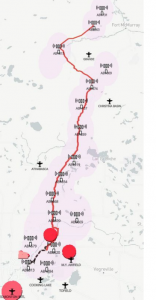The Dutch field lab Unmanned Valley has established a ‘risk-based and managed’ test environment for drone tests flights. Supported by drone consultancy and software developer AirHub, Unmanned Valley is to research the precise route of a BVLOS corridor from Unmanned Valley to the North Sea and the conditions in which BVLOS flights can be carried out.
Flying drones in the Netherlands out of the pilot’s sight is conducted sporadically. To perform these ‘Beyond Visual Line of Sight’ or BVLOS flights, a special permission must be obtained per flight. Unmanned Valley – the field lab for sensor-based technologies located at the former Valkenburg naval air base in Katwijk, a coastal town located 16 kilometers north of The Hague in the Netherlands – wants to realize a permanent environment for testing and demonstrating BVLOS concepts.
According to a press release by Unmanned Valley, the Dutch Ministry of Infrastructure and Water Management, the Human Environment and Transport Inspectorate, regional drinking water supply company Dunea, State Forestry and other stakeholders will closely cooperate in this process. The aim is to achieve a ‘risk-based and managed’ test environment in which companies, knowledge institutions and the Dutch government can gain experience for future business cases, safety and regulations. At the same time, it will boost the further development of innovative drone applications and the Dutch drone industry.
“In many industries the use of drones is booming. The economic and societal potential of BVLOS applications in particular is enormous. In order to take full advantage of this, it is essential that there is a permanent opportunity for BVLOS test flights in the Netherlands”, says Theo de Vries, program manager at Unmanned Valley. “Unmanned Valley offers a unique opportunity to research, develop and test drones and other sensor-based innovations responsibly. The field lab is situated approximately 3.5 kilometers behind the North Sea coast and outside a controlled traffic region (CTR) and other no-fly zones.”
Companies in various industries are increasingly interested in the possibilities of BVLOS flying. For example to inspect offshore wind turbines or powerlines, to transport medical goods or to supply sea-going vessels, or to support in emergency situations.
“The experiences of BVLOS projects in the Netherlands and abroad show the potential. This does not alter the fact there is still work that can be done in the field of technology, social acceptance and legislation”, says Stephan van Vuren, drone consultant and co-founder of AirHub. “Collaboration is key. When all stakeholders help to eliminate barriers and thus create a permanent opportunity for testing and demonstrating BVLOS concepts, we take the industry further, support the scalability and public acceptance of innovative applications, and prevent innovation from leaking into countries around us, while at the same time making a significant contribution to a robust framework for ‘real BVLOS operations’ in the future.”
Unmanned Valley is an initiative of Delft University of Technology and the municipality of Katwijk – made possible by the Dutch central and regional government as well as the EU’s European Regional Development Fund (ERDF) – and will develop into a breeding ground for high-tech activities. The first drone and aerospace companies have already moved to Unmanned Valley.

For more information visit:




